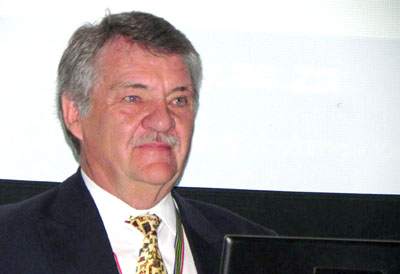Latest News Archive
Please select Category, Year, and then Month to display items
29 August 2024
|
Story Anthony Mthembu
|
Photo Harmse Photography
 Ross van Reenen, CEO of the Toyota Free State Cheetahs.
Ross van Reenen, CEO of the Toyota Free State Cheetahs.
The Business School at the University of the Free State (UFS) recently hosted the CEO of the Toyota Free State Cheetahs, Ross van Reenen, for a guest lecture. Van Reenen presented the guest lecture in the Business School Auditorium on the UFS Bloemfontein Campus on 21 August 2024.
Reflecting on Van Reenen’s address
In a lecture addressed to an auditorium filled with UFS staff and students, Van Reenen’s talk was divided into several sections. Firstly, he spoke about the concept of the ‘black swan’ in reference to the book written by Nassim Nicholas Taleb, titled The Black Swan: The Impact of the Highly Improbable. Referring to Taleb’s book, Van Reenen defined a ‘black swan’ as a rare event that has a severe impact, and the occurrence of which people try to explain. He used some examples to explore this concept as well as its implications, including COVID-19 and its impact on the world, and the tragic death of the people in the Titanic disaster. However, he delved deeper into 9/11 and the extent of its impact, saying that “9/11 was a major wake-up call in the world economy”. Van Reenen highlighted how some companies such as Barclays, for which he previously consulted, had to work to be up and running after the collapse of the Twin Towers in 9/11.
In addition, Van Reenen’s lecture also touched on the importance of the first ninety days of a job after an individual has been employed. “Those first ninety days are crucial, as you have to establish yourself in a company where you are paid less than you are worth,” Van Reenen said. As such, he gave the audience insight into what they could focus on in that time frame. This includes focusing on the small wins, as well as ensuring that you are working at keeping the team together, as the team is an integral part of an organisation.
Van Reenen concluded his address by speaking about his time as the CEO of the Toyota Free State Cheetahs, including some of the decisions he took to ensure the success of the organisation.
Prof. Johan Grobbelaar part of history
2010-09-23
 |
|
Prof. Johan Grobbelaar from the Department of Plant Sciences at the recent 31st Congress of the International Limnological Society (SIL), which was held in Cape Town.
Photo: Supplied
|
The 31st Congress of the International Limnological Society (SIL) was recently held at the Cape Town International Convention Centre (CTICC).
Prof. Johan Grobbelaar from the Department of Plant Sciences at the University of the Free State (UFS), who is also the chairperson of the local organising committee (LOC), worked hard for six years to secure the bid to host the congress in South Africa. The LOC consisted of Prof. Grobbelaar, Prof. Brian Allanson, Prof. Jenny Day, Dr Carin van Ginkel and Dr Mike Silberbauer.
SIL was founded in 1922 to further the study and understanding of all aspects of limnology, the science of inland aquatic ecosystems and their management.
Congresses are held every three years and this was the first time that SIL met on the African continent.
Almost 400 delegates from 42 countries attended this congress where the state of the science of limnology was presented with two keynote speakers, six plenary lectures, 230 oral and 76 poster presentations, mostly running in five parallel sessions. Exhibitions displayed some of South Africa’s role players as well as the latest equipment from abroad. Delegates could also join pre- and post-congress excursions and the new SIL journal, Inland Waters, was launched at the congress.
Many of the presentations dealt with water as a limited resource, pollution problems and the impact of climate change. The congress resolved that SIL would play a more prominent role in creating awareness of problems impacting on inland waters and also afforded solutions. The 32nd SIL congress will be held in Budapest, Hungary in 2013.